

5. Three Platonic Theories. 5.3. The Tripartite Theory of the Soul. In the Republic, Plato introduces a new understanding of the human soul and rationality: the Tripartite Theory of the Soul.
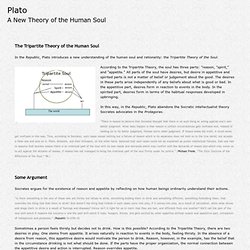
According to the Tripartite Theory, the soul has three parts: "reason, "spirit," and "appetite. " All parts of the soul have desires, but desire in appetitive and spirited parts is not a matter of belief or judgement about the good. The desires in these parts arise independently of any beliefs about what is good or bad. In the appetitive part, desires form in reaction to events in the body. In the spirited part, desires form in terms of the habitual responses developed in upbringing. In this way, in the Republic, Plato abandons the Socratic intellectualist theory Socrates advocates in the Protagoras.
"There is reason to believe that Socrates thought that there is no such thing as acting against one's own better judgment. Socrates argues for the existence of reason and appetite by reflecting on how human beings ordinarily understand their actions. Kant Touch This: The Tripartite Definition of Knowledge. The definition of Knowledge as justified true belief, also known as the tripartite definition of knowledge has long and distinguished history and can be traced back to at least the Platonic dialogues.
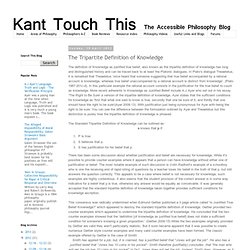
In Plato's dialogue Theaetetus, it is remarked that Theaetetus 'once heard that someone suggesting that true belief accompanied by a rational account is knowledge, whereas true belief unaccompanied by a rational account is distinct from knowledge'. (Plato 1987:201c-d). In this particular example the rational account consists in the justification for the true belief to count as knowledge. More recent adherents to Knowledge as Justified Belief include A.J Ayer who set out in his essay 'The Right to Be Sure' a version of the tripartite definition of knowledge. Ayer states that the sufficient conditions for knowledge as 'first that what one said to know is true, secondly that one be sure of it, and thirdly that one should have the right to be sure'(Ayer 2009:13).
S knows that p if: Welcome to Philosophy News. Revision:As philosophy - theory of knowledge - knowledge and justification. Is Knowledge Justified True Belief? - the tripartite theory and Gettier's counter examples. Traditionally knowledge, at least propositional knowledge, has been defined by philosophers as justified true beliefs.
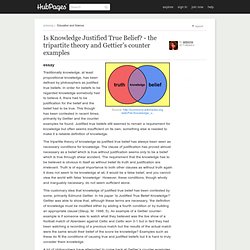
In order for beliefs to be regarded knowledge somebody had to believe it, there had to be justification for the belief and the belief had to be true. This though has been contested in recent times; primarily by Gettier and the counter examples he found. Justified true beliefs still seemed to remain a requirement for knowledge but often seems insufficient on its own, something else is needed to make it a reliable definition of knowledge. What is Knowledge? Studying knowledge is something philosophers have been doing for as long as philosophy has been around.
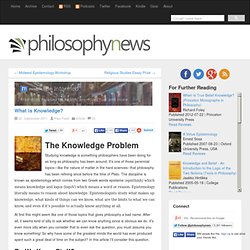
It’s one of those perennial topics—like the nature of matter in the hard sciences--that philosophy has been refining since before the time of Plato. The discipline is known as epistemology which comes from two Greek words episteme (episthmh) which means knowledge and logos (logoV) which means a word or reason. Epistemology literally means to reason about knowledge. Epistemologists study what makes up knowledge, what kinds of things can we know, what are the limits to what we can know, and even if it’s possible to actually know anything at all. At first this might seem like one of those topics that gives philosophy a bad name. Do We Know Stuff? In order to answer that question, you probably have to have some idea what the term “know” means. But if you think about it, each of these has problems.
What about the “broad agreement” criterion? The Analysis of Knowledge. First published Tue Feb 6, 2001; substantive revision Thu Nov 15, 2012.
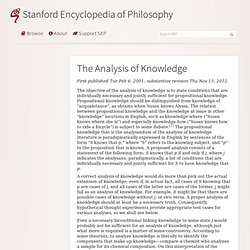
Theory of Knowledge. Barn Façades Counterexample. Carl Ginet Carl Ginet provided a well-known Gettier-style counterexample to the traditional tripartite account of knowledge – that knowledge is justified true belief.
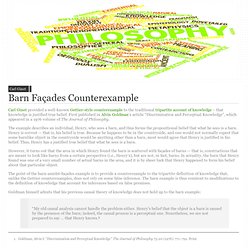
First published in Alvin Goldman’s article “Discrimination and Perceptual Knowledge”, which appeared in a 1976 volume of The Journal of Philosophy. The example describes an individual, Henry, who sees a barn, and thus forms the propositional belief that what he sees is a barn. Henry is correct — that is, his belief is true. Because he happens to be in the countryside, and one would not normally expect that some barnlike object in the countryside would be anything other than a barn, most would agree that Henry is justified in his belief. However, it turns out that the area in which Henry found the barn is scattered with façades of barns — that is, constructions that are meant to look like barns from a certain perspective (i.e., Henry’s), but are not, in fact, barns. “My old causal analysis cannot handle the problem either. British Philosophical Association – representing professional philosophers in the UK.
Title: Shakespeare and the Analysis of Knowledge Description: A paper showing how the plays of Shakespeare can be used as a source of Gettier-type scenarios.
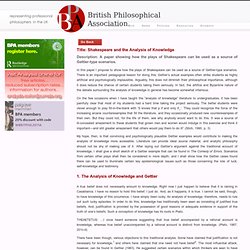
In this paper I propose to show how the plays of Shakespeare can be used as a source of Gettier-type scenarios. There is an important pedagogical reason for doing this. Gettier’s actual examples often strike students as highly artificial and psychologically implausible. Arguably, this does not diminish their philosophical importance, although it does reduce the chance of certain students taking them seriously. On the few occasions when I have taught the “analysis of knowledge” literature to undergraduates, it has been painfully clear that most of my students had a hard time taking the project seriously. My hope, then, is that convincing and psychologically plausible Gettier examples would contribute to making the analysis of knowledge more accessible. 1.
A true belief does not necessarily amount to knowledge. 2. Theory of Knowledge. What is Knowledge? Epistemology. 1.
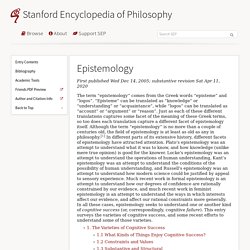
The Varieties of Cognitive Success There are many different kinds of cognitive success, and they differ from one another along various dimensions. Exactly what these various kinds of success are, and how they differ from each other, and how they are explanatorily related to each other, and how they can be achieved or obstructed, are all matters of controversy. This section provides some background to these various controversies. 1.1 What Kinds of Thing Enjoy Cognitive Success?